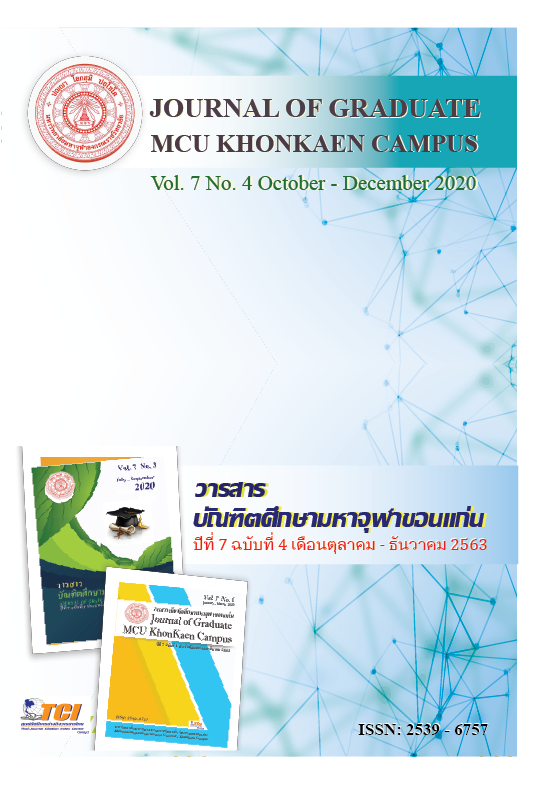A DEVELOPMENT OF BUDDHIST MORALITY FOR THE ULTIMATE GOAL OF LIFE
Main Article Content
Abstract
Self-development or self-discipline is considered the core of wise graduates. The wise people in this world will have to train themselves to progress with various virtues.As Buddhism uses Buddhist principles to develop themselves according to Lokiya is Bhavana4 such as physical development, moral development, emotional development and intellectual development. And the principles of Dharma for the development of LokutraisBhavana 2 such asGrowth, training, cause-up, includingSamathapa-Bhavana is a spiritual training for meditation or meditation. And introspection is the training of wisdom to be enlightened according to truth or wisdom development, called meditation.
These two principles of self-development in order to lead themselves to the ultimate goal of life through the learning process calledKanthathura mean to the business of scripture or tuition Education from the scriptures of the Holy Scriptures, Buddhist texts Throughout the pursuit of various knowledge. Vipassanathura mean Engaged in the development of Vipassana or the practice of prayer Or prosperity Which is also included, with the base having enlightenment as an important part and covering it.
Article Details
References
กรมศาสนา. (2514). พระไตรปิฎกแปลไทย 45 เล่ม ฉบับหลวง. กรุงเทพมหานคร : กรมศาสนา.
มหามกุฏราชวิทยาลัย. (2534). พระไตรปิฎกและอรรถกถาแปล ฉบับ 91. กรุงเทพมหานคร : โรงพิมพ์มหามกุฏราชวิทยาลัย,
พระปิฎกจุฬาภัย. (2550). มิลินทปัญหา. (พิมพ์ครั้งที่ 9). กรุงเทพมหานคร: ประยูรวงศ์ พริ้นท์ติ้ง,
พระธรรมโกศาจารย์ (พุทธทาสภิกขุ). (2550). โพธิปักขิยธรรมประยุกต์. กรุงเทพมหานคร : ตถาคตา พับลิเคชั่น จำกัด.
. 2514. สุขภาพทางจิตวิญญาณ. กรุงเทพมหานคร : ตถาคตาพับลิเคชั่น จำกัด.
. 2516. อิทัปปัจจยตา. กรุงเทพมหานคร: ห้างหุ้นส่วนจำกัด การพิมพ์พระนคร.
พระธรรมโกศาจารย์ (ประยูร ธมฺมจิตฺโต). (2546). การเผยแผ่เชิงรุก. กรุงเทพมหานคร : โรงพิมพ์มหาจุฬาลงกรณราชวิทยาลัย.
พระพรหมคุณาภรณ์ (ป.อ. ปยุตฺโต). (2551). พจนานุกรมพุทธศาสตร์ ฉบับประมวลธรรม. (พิมพ์ครั้งที่ 16). กรุงเทพมหานคร: เอสอาร์พริ้นติ้งแมสโปรดักส์จำกัด.
พระพรหมคุณาภรณ์ (ป.อ. ปยุตฺโต,). (2544). การศึกษากับการวิจัย. (พิมพ์ครั้งที่ 2). กรุงเทพมหานคร : มูลนิธิพุทธธรรม.
. (2546). พจนานุกรมพุทธศาสน์ ฉบับประมวลศัพท์. (พิมพ์ครั้งที่ 11). กรุงเทพมหานคร : โรงพิมพ์ มหาจุฬาลงกรณราชวิทยาลัย.
. (2547). วิธีคิดแบบหลักพุทธธรรม. กรุงเทพมหานคร : ธรรมสารจำกัด.
. (2548). วิสัยธรรม เพื่อเบิกนำวิสัยทัศน์. กรุงเทพมหานคร : พิมพ์สวยจำกัด.
พระมหาวุฒิชัย วชิรเมธี (ว. วชิรเมธี). (2553). ความทุกข์มาโปรดความสุขโปรยปราย. กรุงเทพมหานคร : พับลิชชิ่งจำกัด.
วนิษาเรช. (2550). อัจฉริยะสร้างได้. ปทุมธานี : อัจฉริยะสร้างได้จำกัด.
สุภีร์ ทุมทอง. (2557). อริยมรรคมีองค์ 8 ภาคปฏิบัติ. กรุงเทพมหานคร : ห้างหุ้นส่วนจำกัด ภาพพิมพ์.
สำนักงานราชบัณฑิตยสถาน. (2525). พจนานุกรมฉบับราชบัณฑิตยสถาน. (พิมพ์ครั้งที่ 2). กรุงเทพมหานคร : อักษรเจริญทัศน์.
Bukkyo Dendokyokai. (1998). The Teaching of Buddha. Printed by Kosaido Printing Co., Ltd.
P.A. Payutto. (2017). A constitution for living. Petandhome : Bangkok.
Ratasiri Budsripum. (2012).Buddhism Articles For Human. Mahachulallongkornrajavidyalaya University, Khonkaen Campus, Thailand
Somdej PhraNyanasamvara. (2535). Plan of life. Bangkok: Mahamakut printing.
Somparn Pramta. (2008). An Essay Concerning Buddhist Ethics. Bangkok: Chulalongkorn University Press.

